Nursing Ethics and Legal Considerations: A Case Study in Australia
VerifiedAdded on 2023/01/11
|10
|2452
|1
Essay
AI Summary
This paper examines the ethical and legal dimensions of nursing practice, particularly within the Australian healthcare context. The introduction underscores the importance of ethical and legal values in guiding nurses to ensure quality patient care. The paper delves into the four main ethical principles: autonomy, beneficence, justice, and non-maleficence, illustrating their practical application through a detailed case study involving a post-operative patient named Mavis. The analysis explores how the nurse navigates ethical dilemmas, such as respecting patient autonomy when the patient's decisions conflict with the nurse's professional judgment. The discussion extends to other ethical considerations, including truthfulness, confidentiality, and informed consent. Furthermore, the paper addresses legal issues in nursing, emphasizing the importance of adhering to legal standards to ensure competent and holistic care and avoid negligence. The conclusion reiterates the interplay between ethical and legal considerations in fostering high-quality healthcare and preventing malpractice, reinforcing the significance of these principles in nursing practice. The references provided support the academic rigor of the paper.
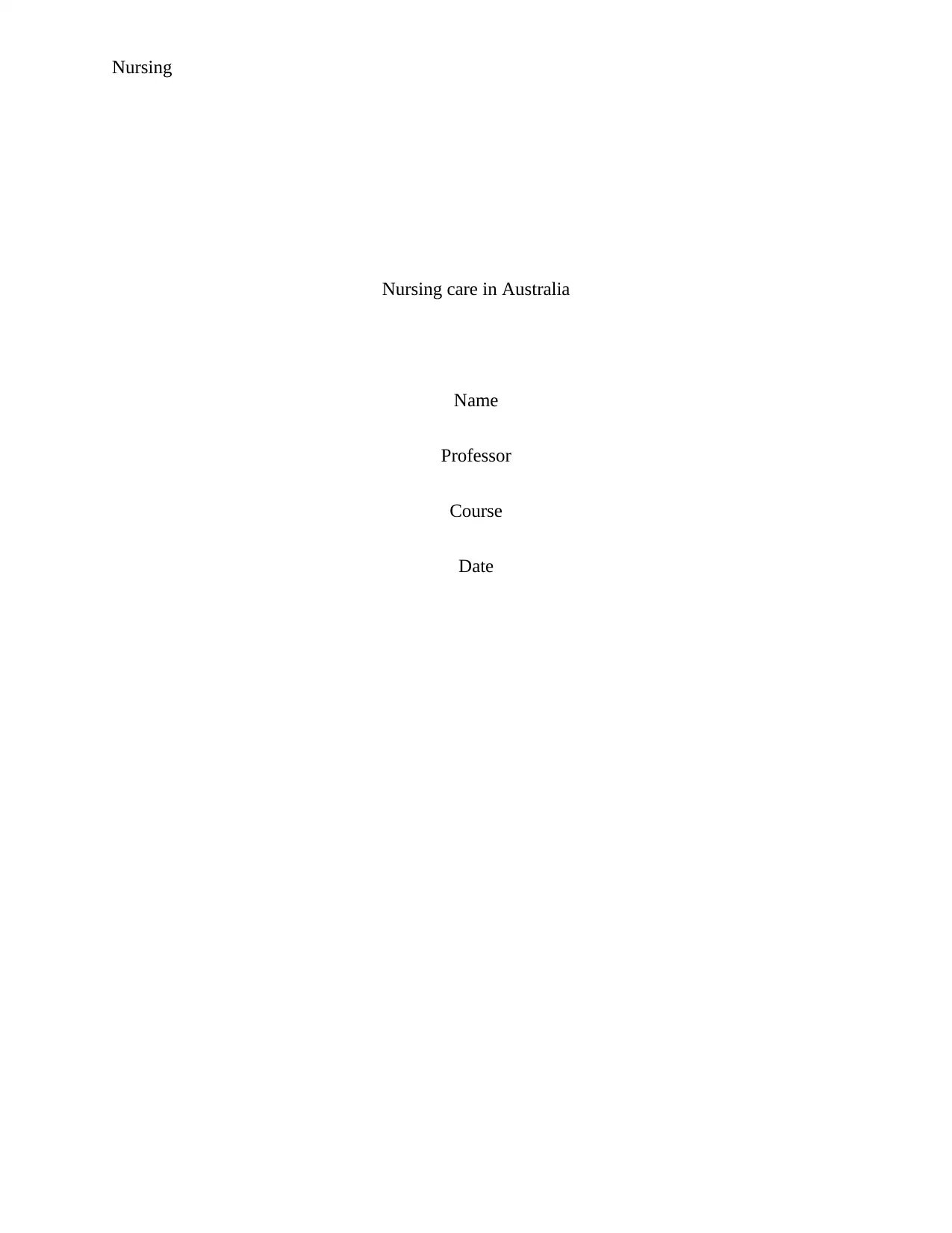
Nursing
Nursing care in Australia
Name
Professor
Course
Date
Nursing care in Australia
Name
Professor
Course
Date
Paraphrase This Document
Need a fresh take? Get an instant paraphrase of this document with our AI Paraphraser
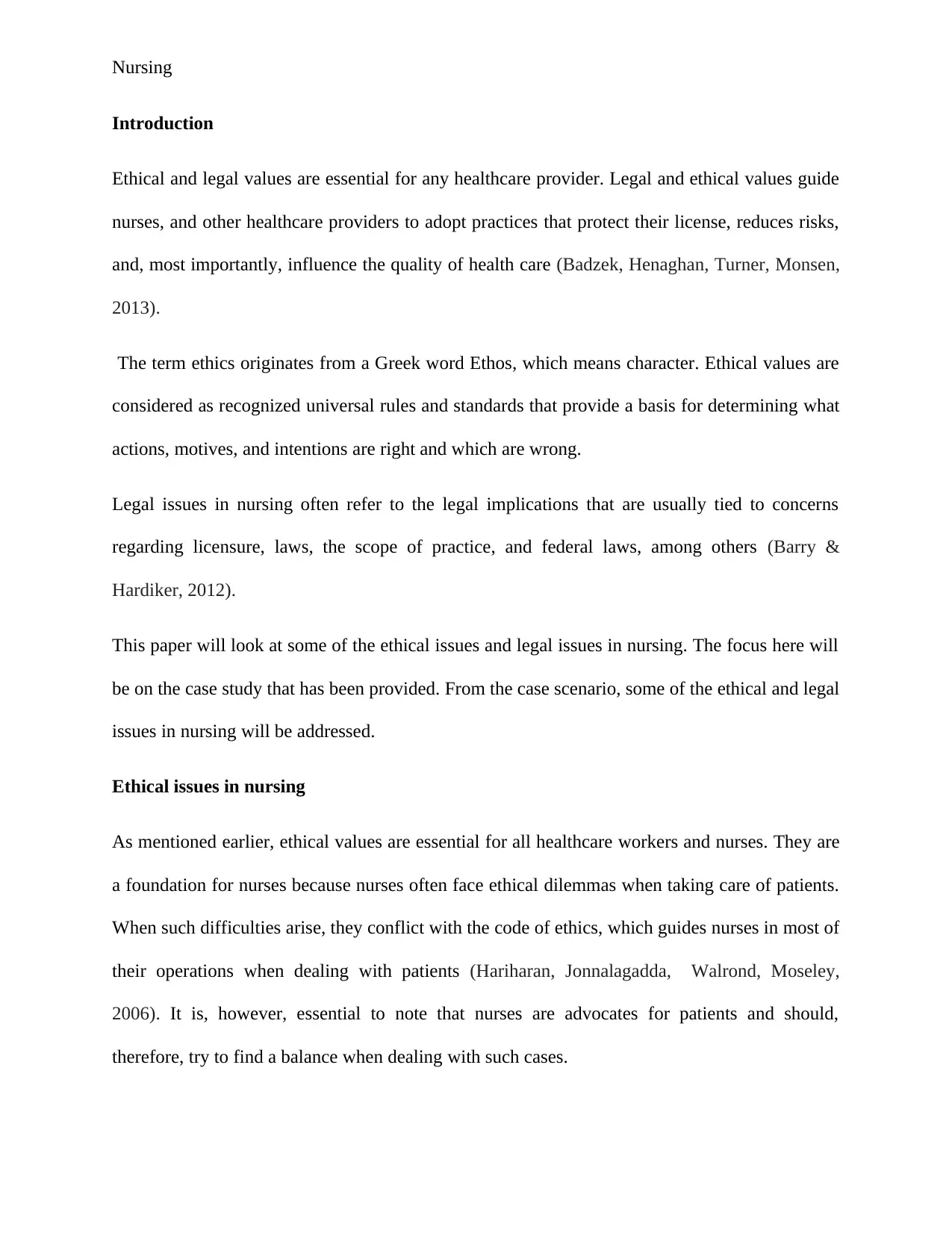
Nursing
Introduction
Ethical and legal values are essential for any healthcare provider. Legal and ethical values guide
nurses, and other healthcare providers to adopt practices that protect their license, reduces risks,
and, most importantly, influence the quality of health care (Badzek, Henaghan, Turner, Monsen,
2013).
The term ethics originates from a Greek word Ethos, which means character. Ethical values are
considered as recognized universal rules and standards that provide a basis for determining what
actions, motives, and intentions are right and which are wrong.
Legal issues in nursing often refer to the legal implications that are usually tied to concerns
regarding licensure, laws, the scope of practice, and federal laws, among others (Barry &
Hardiker, 2012).
This paper will look at some of the ethical issues and legal issues in nursing. The focus here will
be on the case study that has been provided. From the case scenario, some of the ethical and legal
issues in nursing will be addressed.
Ethical issues in nursing
As mentioned earlier, ethical values are essential for all healthcare workers and nurses. They are
a foundation for nurses because nurses often face ethical dilemmas when taking care of patients.
When such difficulties arise, they conflict with the code of ethics, which guides nurses in most of
their operations when dealing with patients (Hariharan, Jonnalagadda, Walrond, Moseley,
2006). It is, however, essential to note that nurses are advocates for patients and should,
therefore, try to find a balance when dealing with such cases.
Introduction
Ethical and legal values are essential for any healthcare provider. Legal and ethical values guide
nurses, and other healthcare providers to adopt practices that protect their license, reduces risks,
and, most importantly, influence the quality of health care (Badzek, Henaghan, Turner, Monsen,
2013).
The term ethics originates from a Greek word Ethos, which means character. Ethical values are
considered as recognized universal rules and standards that provide a basis for determining what
actions, motives, and intentions are right and which are wrong.
Legal issues in nursing often refer to the legal implications that are usually tied to concerns
regarding licensure, laws, the scope of practice, and federal laws, among others (Barry &
Hardiker, 2012).
This paper will look at some of the ethical issues and legal issues in nursing. The focus here will
be on the case study that has been provided. From the case scenario, some of the ethical and legal
issues in nursing will be addressed.
Ethical issues in nursing
As mentioned earlier, ethical values are essential for all healthcare workers and nurses. They are
a foundation for nurses because nurses often face ethical dilemmas when taking care of patients.
When such difficulties arise, they conflict with the code of ethics, which guides nurses in most of
their operations when dealing with patients (Hariharan, Jonnalagadda, Walrond, Moseley,
2006). It is, however, essential to note that nurses are advocates for patients and should,
therefore, try to find a balance when dealing with such cases.
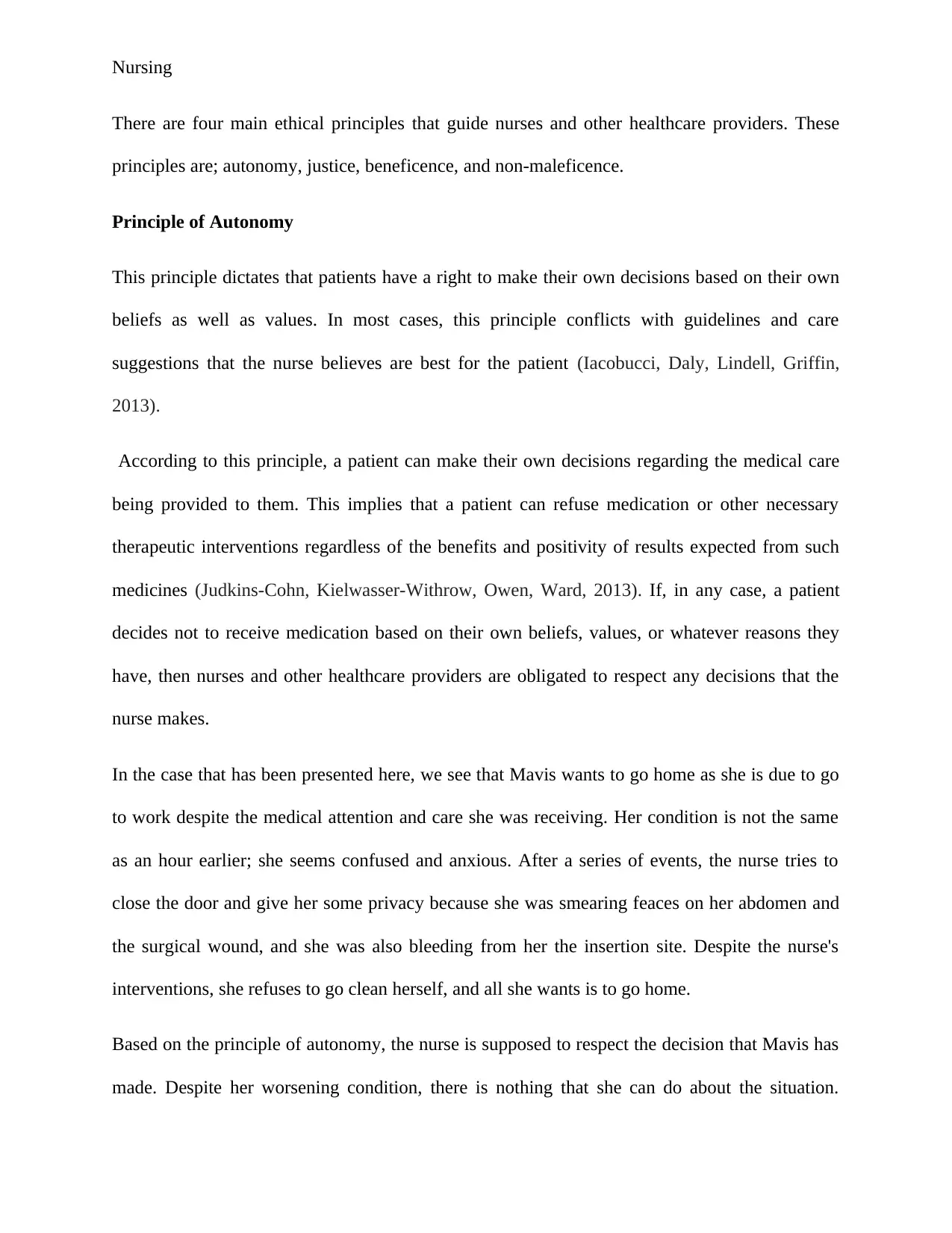
Nursing
There are four main ethical principles that guide nurses and other healthcare providers. These
principles are; autonomy, justice, beneficence, and non-maleficence.
Principle of Autonomy
This principle dictates that patients have a right to make their own decisions based on their own
beliefs as well as values. In most cases, this principle conflicts with guidelines and care
suggestions that the nurse believes are best for the patient (Iacobucci, Daly, Lindell, Griffin,
2013).
According to this principle, a patient can make their own decisions regarding the medical care
being provided to them. This implies that a patient can refuse medication or other necessary
therapeutic interventions regardless of the benefits and positivity of results expected from such
medicines (Judkins-Cohn, Kielwasser-Withrow, Owen, Ward, 2013). If, in any case, a patient
decides not to receive medication based on their own beliefs, values, or whatever reasons they
have, then nurses and other healthcare providers are obligated to respect any decisions that the
nurse makes.
In the case that has been presented here, we see that Mavis wants to go home as she is due to go
to work despite the medical attention and care she was receiving. Her condition is not the same
as an hour earlier; she seems confused and anxious. After a series of events, the nurse tries to
close the door and give her some privacy because she was smearing feaces on her abdomen and
the surgical wound, and she was also bleeding from her the insertion site. Despite the nurse's
interventions, she refuses to go clean herself, and all she wants is to go home.
Based on the principle of autonomy, the nurse is supposed to respect the decision that Mavis has
made. Despite her worsening condition, there is nothing that she can do about the situation.
There are four main ethical principles that guide nurses and other healthcare providers. These
principles are; autonomy, justice, beneficence, and non-maleficence.
Principle of Autonomy
This principle dictates that patients have a right to make their own decisions based on their own
beliefs as well as values. In most cases, this principle conflicts with guidelines and care
suggestions that the nurse believes are best for the patient (Iacobucci, Daly, Lindell, Griffin,
2013).
According to this principle, a patient can make their own decisions regarding the medical care
being provided to them. This implies that a patient can refuse medication or other necessary
therapeutic interventions regardless of the benefits and positivity of results expected from such
medicines (Judkins-Cohn, Kielwasser-Withrow, Owen, Ward, 2013). If, in any case, a patient
decides not to receive medication based on their own beliefs, values, or whatever reasons they
have, then nurses and other healthcare providers are obligated to respect any decisions that the
nurse makes.
In the case that has been presented here, we see that Mavis wants to go home as she is due to go
to work despite the medical attention and care she was receiving. Her condition is not the same
as an hour earlier; she seems confused and anxious. After a series of events, the nurse tries to
close the door and give her some privacy because she was smearing feaces on her abdomen and
the surgical wound, and she was also bleeding from her the insertion site. Despite the nurse's
interventions, she refuses to go clean herself, and all she wants is to go home.
Based on the principle of autonomy, the nurse is supposed to respect the decision that Mavis has
made. Despite her worsening condition, there is nothing that she can do about the situation.
⊘ This is a preview!⊘
Do you want full access?
Subscribe today to unlock all pages.

Trusted by 1+ million students worldwide
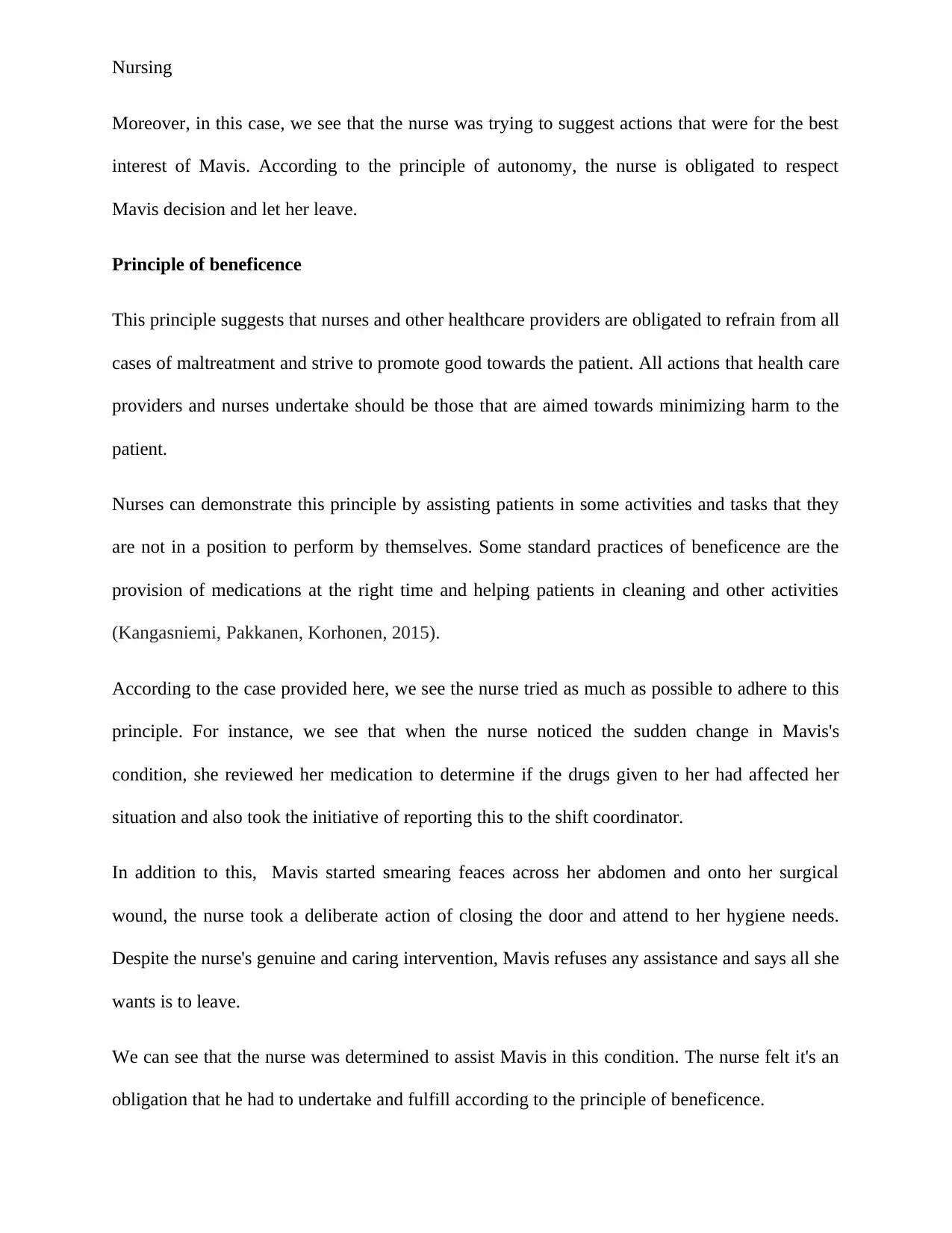
Nursing
Moreover, in this case, we see that the nurse was trying to suggest actions that were for the best
interest of Mavis. According to the principle of autonomy, the nurse is obligated to respect
Mavis decision and let her leave.
Principle of beneficence
This principle suggests that nurses and other healthcare providers are obligated to refrain from all
cases of maltreatment and strive to promote good towards the patient. All actions that health care
providers and nurses undertake should be those that are aimed towards minimizing harm to the
patient.
Nurses can demonstrate this principle by assisting patients in some activities and tasks that they
are not in a position to perform by themselves. Some standard practices of beneficence are the
provision of medications at the right time and helping patients in cleaning and other activities
(Kangasniemi, Pakkanen, Korhonen, 2015).
According to the case provided here, we see the nurse tried as much as possible to adhere to this
principle. For instance, we see that when the nurse noticed the sudden change in Mavis's
condition, she reviewed her medication to determine if the drugs given to her had affected her
situation and also took the initiative of reporting this to the shift coordinator.
In addition to this, Mavis started smearing feaces across her abdomen and onto her surgical
wound, the nurse took a deliberate action of closing the door and attend to her hygiene needs.
Despite the nurse's genuine and caring intervention, Mavis refuses any assistance and says all she
wants is to leave.
We can see that the nurse was determined to assist Mavis in this condition. The nurse felt it's an
obligation that he had to undertake and fulfill according to the principle of beneficence.
Moreover, in this case, we see that the nurse was trying to suggest actions that were for the best
interest of Mavis. According to the principle of autonomy, the nurse is obligated to respect
Mavis decision and let her leave.
Principle of beneficence
This principle suggests that nurses and other healthcare providers are obligated to refrain from all
cases of maltreatment and strive to promote good towards the patient. All actions that health care
providers and nurses undertake should be those that are aimed towards minimizing harm to the
patient.
Nurses can demonstrate this principle by assisting patients in some activities and tasks that they
are not in a position to perform by themselves. Some standard practices of beneficence are the
provision of medications at the right time and helping patients in cleaning and other activities
(Kangasniemi, Pakkanen, Korhonen, 2015).
According to the case provided here, we see the nurse tried as much as possible to adhere to this
principle. For instance, we see that when the nurse noticed the sudden change in Mavis's
condition, she reviewed her medication to determine if the drugs given to her had affected her
situation and also took the initiative of reporting this to the shift coordinator.
In addition to this, Mavis started smearing feaces across her abdomen and onto her surgical
wound, the nurse took a deliberate action of closing the door and attend to her hygiene needs.
Despite the nurse's genuine and caring intervention, Mavis refuses any assistance and says all she
wants is to leave.
We can see that the nurse was determined to assist Mavis in this condition. The nurse felt it's an
obligation that he had to undertake and fulfill according to the principle of beneficence.
Paraphrase This Document
Need a fresh take? Get an instant paraphrase of this document with our AI Paraphraser
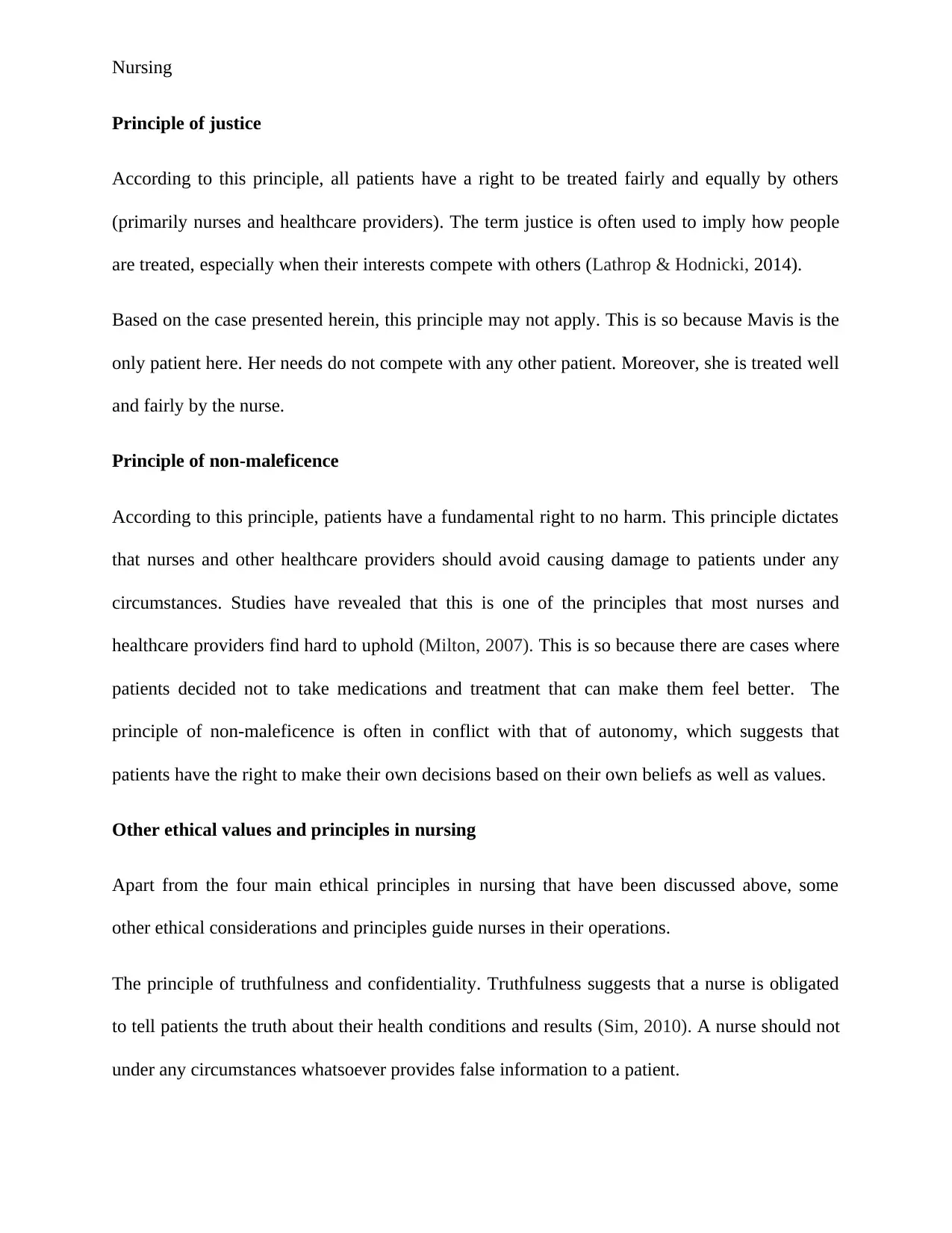
Nursing
Principle of justice
According to this principle, all patients have a right to be treated fairly and equally by others
(primarily nurses and healthcare providers). The term justice is often used to imply how people
are treated, especially when their interests compete with others (Lathrop & Hodnicki, 2014).
Based on the case presented herein, this principle may not apply. This is so because Mavis is the
only patient here. Her needs do not compete with any other patient. Moreover, she is treated well
and fairly by the nurse.
Principle of non-maleficence
According to this principle, patients have a fundamental right to no harm. This principle dictates
that nurses and other healthcare providers should avoid causing damage to patients under any
circumstances. Studies have revealed that this is one of the principles that most nurses and
healthcare providers find hard to uphold (Milton, 2007). This is so because there are cases where
patients decided not to take medications and treatment that can make them feel better. The
principle of non-maleficence is often in conflict with that of autonomy, which suggests that
patients have the right to make their own decisions based on their own beliefs as well as values.
Other ethical values and principles in nursing
Apart from the four main ethical principles in nursing that have been discussed above, some
other ethical considerations and principles guide nurses in their operations.
The principle of truthfulness and confidentiality. Truthfulness suggests that a nurse is obligated
to tell patients the truth about their health conditions and results (Sim, 2010). A nurse should not
under any circumstances whatsoever provides false information to a patient.
Principle of justice
According to this principle, all patients have a right to be treated fairly and equally by others
(primarily nurses and healthcare providers). The term justice is often used to imply how people
are treated, especially when their interests compete with others (Lathrop & Hodnicki, 2014).
Based on the case presented herein, this principle may not apply. This is so because Mavis is the
only patient here. Her needs do not compete with any other patient. Moreover, she is treated well
and fairly by the nurse.
Principle of non-maleficence
According to this principle, patients have a fundamental right to no harm. This principle dictates
that nurses and other healthcare providers should avoid causing damage to patients under any
circumstances. Studies have revealed that this is one of the principles that most nurses and
healthcare providers find hard to uphold (Milton, 2007). This is so because there are cases where
patients decided not to take medications and treatment that can make them feel better. The
principle of non-maleficence is often in conflict with that of autonomy, which suggests that
patients have the right to make their own decisions based on their own beliefs as well as values.
Other ethical values and principles in nursing
Apart from the four main ethical principles in nursing that have been discussed above, some
other ethical considerations and principles guide nurses in their operations.
The principle of truthfulness and confidentiality. Truthfulness suggests that a nurse is obligated
to tell patients the truth about their health conditions and results (Sim, 2010). A nurse should not
under any circumstances whatsoever provides false information to a patient.
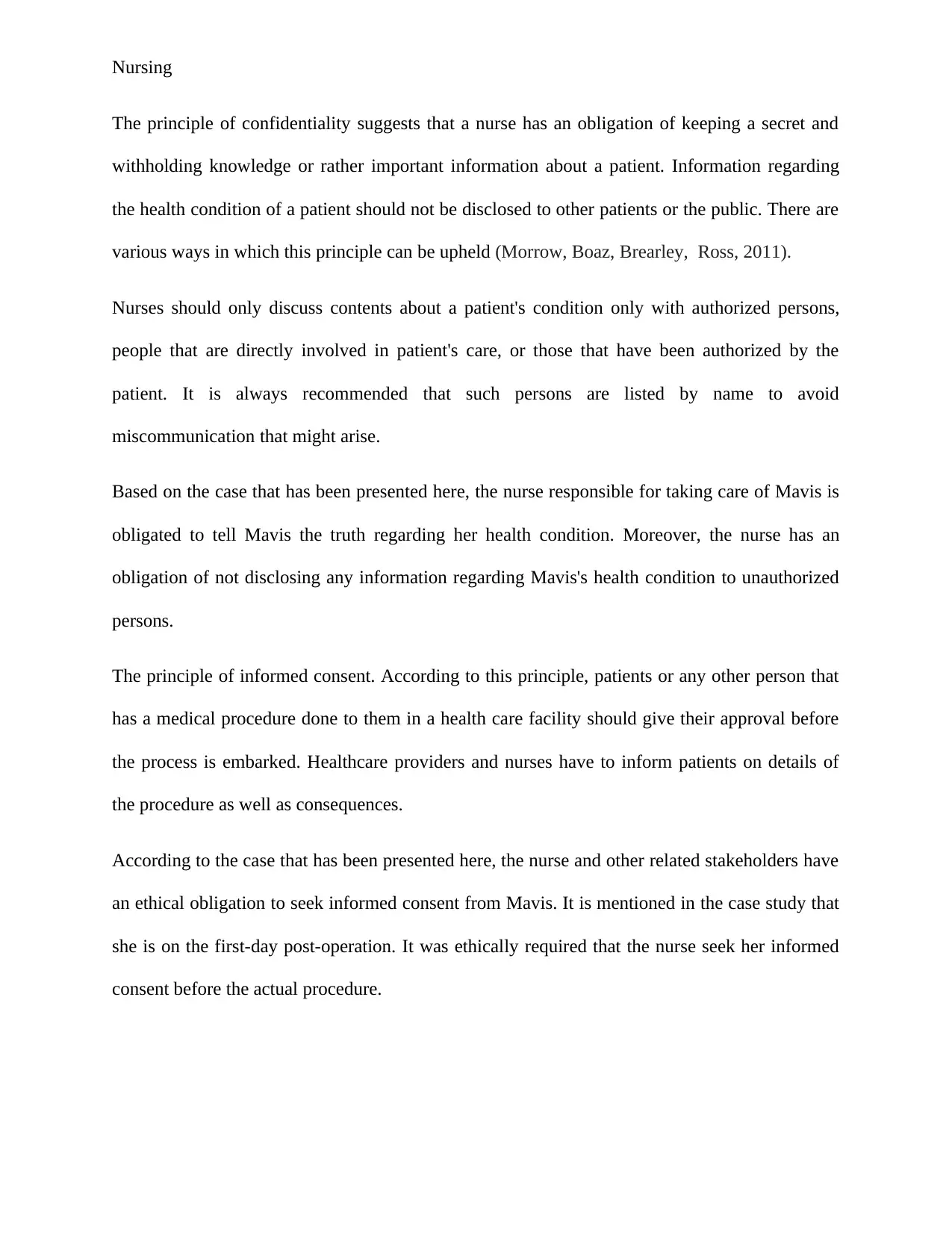
Nursing
The principle of confidentiality suggests that a nurse has an obligation of keeping a secret and
withholding knowledge or rather important information about a patient. Information regarding
the health condition of a patient should not be disclosed to other patients or the public. There are
various ways in which this principle can be upheld (Morrow, Boaz, Brearley, Ross, 2011).
Nurses should only discuss contents about a patient's condition only with authorized persons,
people that are directly involved in patient's care, or those that have been authorized by the
patient. It is always recommended that such persons are listed by name to avoid
miscommunication that might arise.
Based on the case that has been presented here, the nurse responsible for taking care of Mavis is
obligated to tell Mavis the truth regarding her health condition. Moreover, the nurse has an
obligation of not disclosing any information regarding Mavis's health condition to unauthorized
persons.
The principle of informed consent. According to this principle, patients or any other person that
has a medical procedure done to them in a health care facility should give their approval before
the process is embarked. Healthcare providers and nurses have to inform patients on details of
the procedure as well as consequences.
According to the case that has been presented here, the nurse and other related stakeholders have
an ethical obligation to seek informed consent from Mavis. It is mentioned in the case study that
she is on the first-day post-operation. It was ethically required that the nurse seek her informed
consent before the actual procedure.
The principle of confidentiality suggests that a nurse has an obligation of keeping a secret and
withholding knowledge or rather important information about a patient. Information regarding
the health condition of a patient should not be disclosed to other patients or the public. There are
various ways in which this principle can be upheld (Morrow, Boaz, Brearley, Ross, 2011).
Nurses should only discuss contents about a patient's condition only with authorized persons,
people that are directly involved in patient's care, or those that have been authorized by the
patient. It is always recommended that such persons are listed by name to avoid
miscommunication that might arise.
Based on the case that has been presented here, the nurse responsible for taking care of Mavis is
obligated to tell Mavis the truth regarding her health condition. Moreover, the nurse has an
obligation of not disclosing any information regarding Mavis's health condition to unauthorized
persons.
The principle of informed consent. According to this principle, patients or any other person that
has a medical procedure done to them in a health care facility should give their approval before
the process is embarked. Healthcare providers and nurses have to inform patients on details of
the procedure as well as consequences.
According to the case that has been presented here, the nurse and other related stakeholders have
an ethical obligation to seek informed consent from Mavis. It is mentioned in the case study that
she is on the first-day post-operation. It was ethically required that the nurse seek her informed
consent before the actual procedure.
⊘ This is a preview!⊘
Do you want full access?
Subscribe today to unlock all pages.

Trusted by 1+ million students worldwide
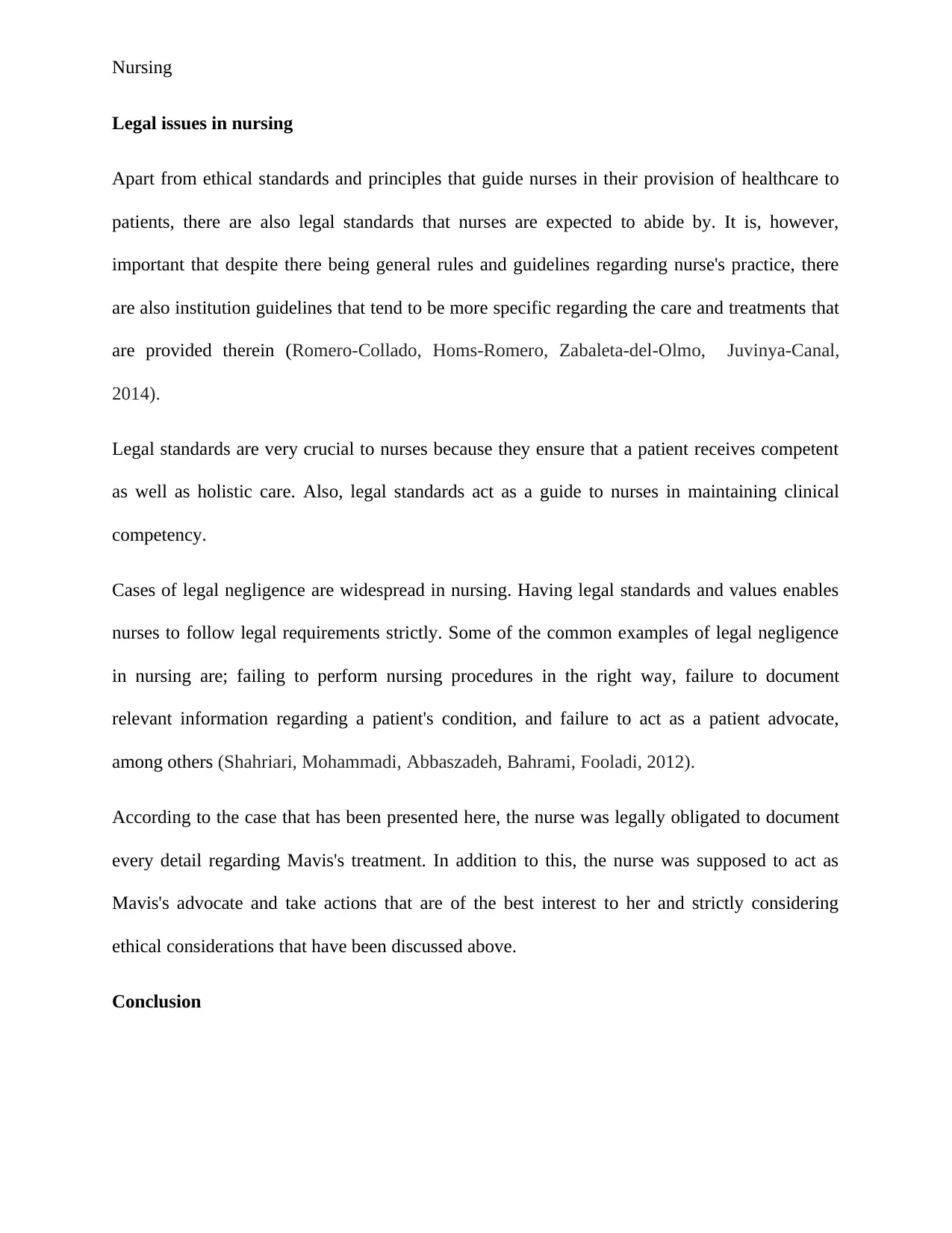
Nursing
Legal issues in nursing
Apart from ethical standards and principles that guide nurses in their provision of healthcare to
patients, there are also legal standards that nurses are expected to abide by. It is, however,
important that despite there being general rules and guidelines regarding nurse's practice, there
are also institution guidelines that tend to be more specific regarding the care and treatments that
are provided therein (Romero‐Collado, Homs‐Romero, Zabaleta‐del‐Olmo, Juvinya‐Canal,
2014).
Legal standards are very crucial to nurses because they ensure that a patient receives competent
as well as holistic care. Also, legal standards act as a guide to nurses in maintaining clinical
competency.
Cases of legal negligence are widespread in nursing. Having legal standards and values enables
nurses to follow legal requirements strictly. Some of the common examples of legal negligence
in nursing are; failing to perform nursing procedures in the right way, failure to document
relevant information regarding a patient's condition, and failure to act as a patient advocate,
among others (Shahriari, Mohammadi, Abbaszadeh, Bahrami, Fooladi, 2012).
According to the case that has been presented here, the nurse was legally obligated to document
every detail regarding Mavis's treatment. In addition to this, the nurse was supposed to act as
Mavis's advocate and take actions that are of the best interest to her and strictly considering
ethical considerations that have been discussed above.
Conclusion
Legal issues in nursing
Apart from ethical standards and principles that guide nurses in their provision of healthcare to
patients, there are also legal standards that nurses are expected to abide by. It is, however,
important that despite there being general rules and guidelines regarding nurse's practice, there
are also institution guidelines that tend to be more specific regarding the care and treatments that
are provided therein (Romero‐Collado, Homs‐Romero, Zabaleta‐del‐Olmo, Juvinya‐Canal,
2014).
Legal standards are very crucial to nurses because they ensure that a patient receives competent
as well as holistic care. Also, legal standards act as a guide to nurses in maintaining clinical
competency.
Cases of legal negligence are widespread in nursing. Having legal standards and values enables
nurses to follow legal requirements strictly. Some of the common examples of legal negligence
in nursing are; failing to perform nursing procedures in the right way, failure to document
relevant information regarding a patient's condition, and failure to act as a patient advocate,
among others (Shahriari, Mohammadi, Abbaszadeh, Bahrami, Fooladi, 2012).
According to the case that has been presented here, the nurse was legally obligated to document
every detail regarding Mavis's treatment. In addition to this, the nurse was supposed to act as
Mavis's advocate and take actions that are of the best interest to her and strictly considering
ethical considerations that have been discussed above.
Conclusion
Paraphrase This Document
Need a fresh take? Get an instant paraphrase of this document with our AI Paraphraser
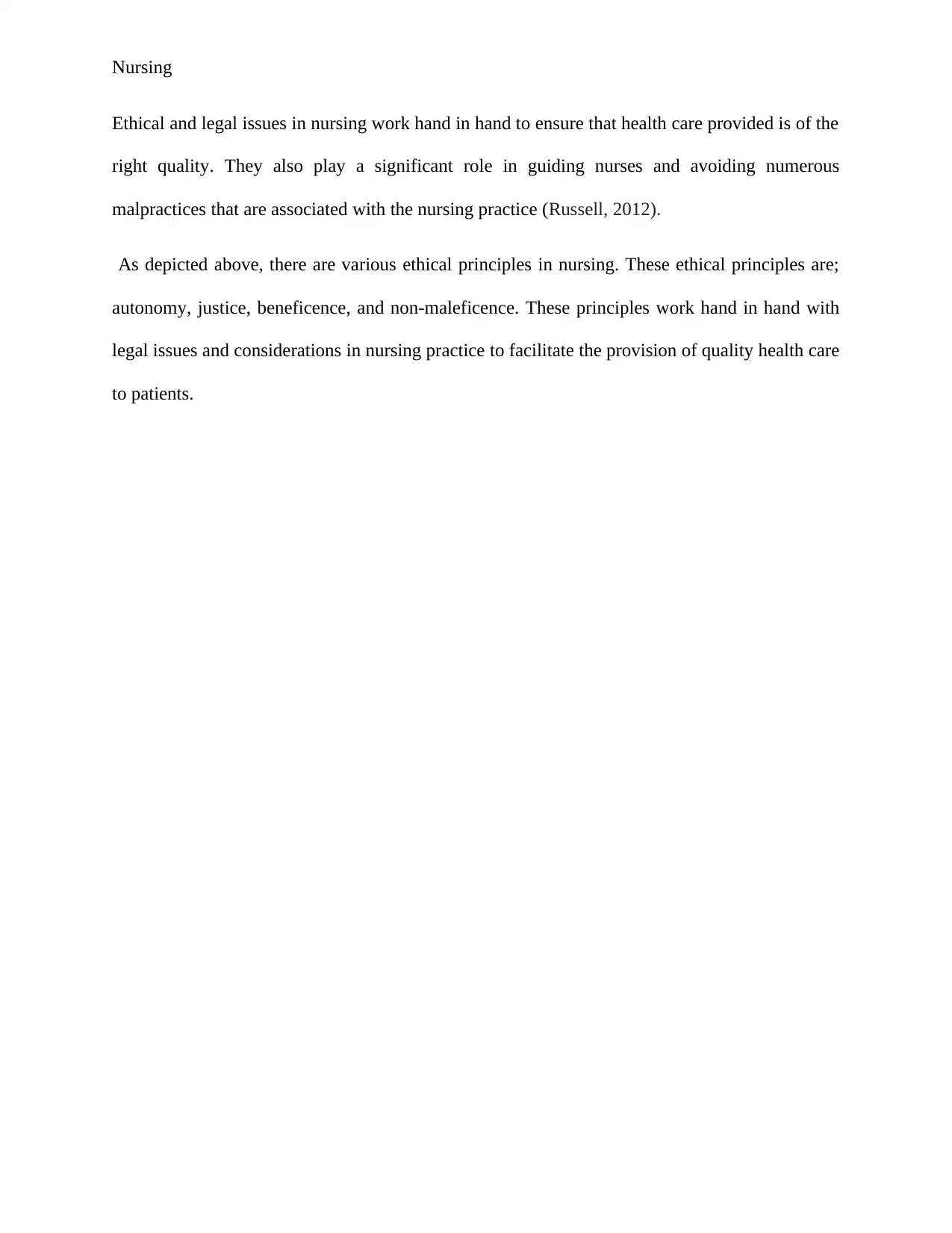
Nursing
Ethical and legal issues in nursing work hand in hand to ensure that health care provided is of the
right quality. They also play a significant role in guiding nurses and avoiding numerous
malpractices that are associated with the nursing practice (Russell, 2012).
As depicted above, there are various ethical principles in nursing. These ethical principles are;
autonomy, justice, beneficence, and non-maleficence. These principles work hand in hand with
legal issues and considerations in nursing practice to facilitate the provision of quality health care
to patients.
Ethical and legal issues in nursing work hand in hand to ensure that health care provided is of the
right quality. They also play a significant role in guiding nurses and avoiding numerous
malpractices that are associated with the nursing practice (Russell, 2012).
As depicted above, there are various ethical principles in nursing. These ethical principles are;
autonomy, justice, beneficence, and non-maleficence. These principles work hand in hand with
legal issues and considerations in nursing practice to facilitate the provision of quality health care
to patients.
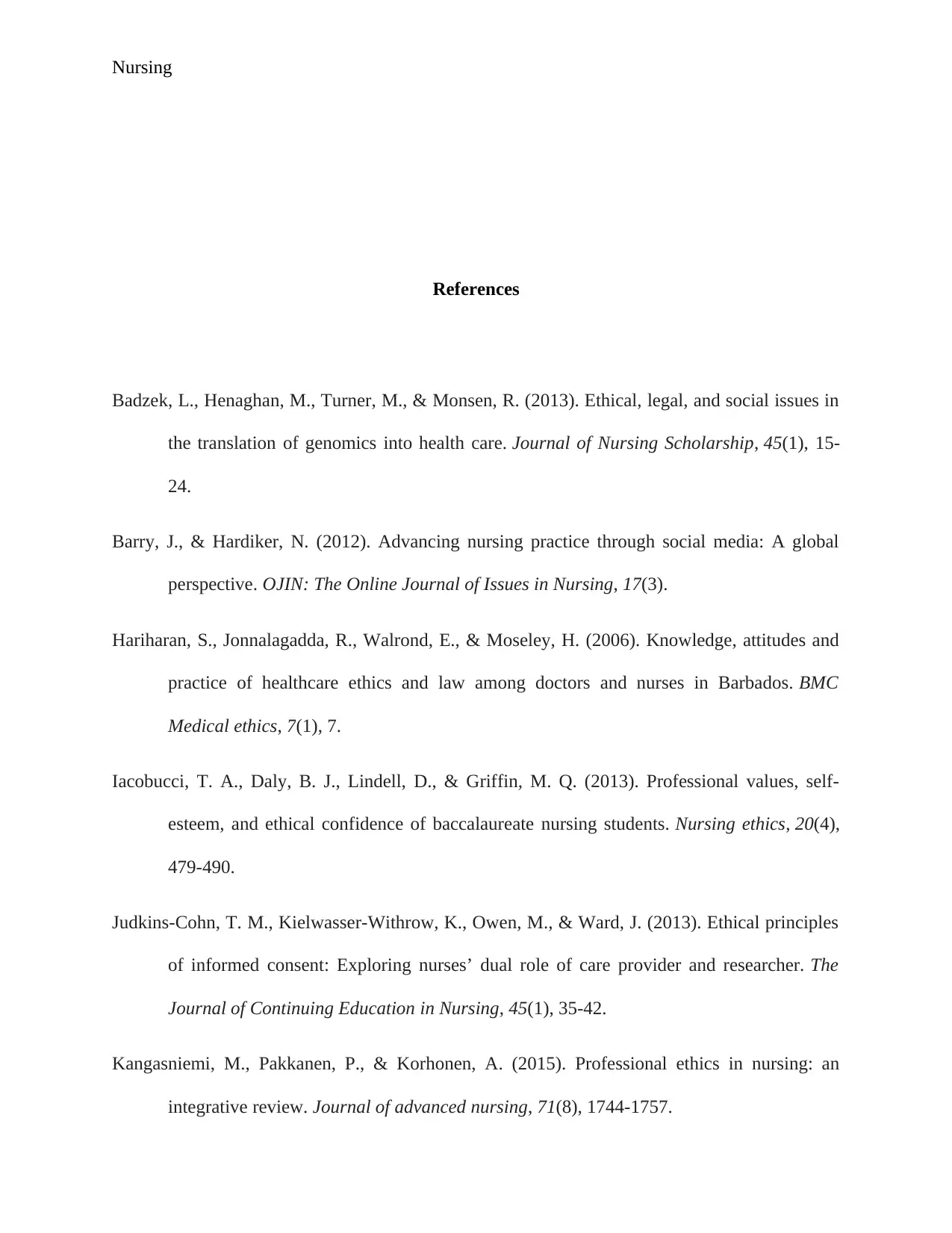
Nursing
References
Badzek, L., Henaghan, M., Turner, M., & Monsen, R. (2013). Ethical, legal, and social issues in
the translation of genomics into health care. Journal of Nursing Scholarship, 45(1), 15-
24.
Barry, J., & Hardiker, N. (2012). Advancing nursing practice through social media: A global
perspective. OJIN: The Online Journal of Issues in Nursing, 17(3).
Hariharan, S., Jonnalagadda, R., Walrond, E., & Moseley, H. (2006). Knowledge, attitudes and
practice of healthcare ethics and law among doctors and nurses in Barbados. BMC
Medical ethics, 7(1), 7.
Iacobucci, T. A., Daly, B. J., Lindell, D., & Griffin, M. Q. (2013). Professional values, self-
esteem, and ethical confidence of baccalaureate nursing students. Nursing ethics, 20(4),
479-490.
Judkins-Cohn, T. M., Kielwasser-Withrow, K., Owen, M., & Ward, J. (2013). Ethical principles
of informed consent: Exploring nurses’ dual role of care provider and researcher. The
Journal of Continuing Education in Nursing, 45(1), 35-42.
Kangasniemi, M., Pakkanen, P., & Korhonen, A. (2015). Professional ethics in nursing: an
integrative review. Journal of advanced nursing, 71(8), 1744-1757.
References
Badzek, L., Henaghan, M., Turner, M., & Monsen, R. (2013). Ethical, legal, and social issues in
the translation of genomics into health care. Journal of Nursing Scholarship, 45(1), 15-
24.
Barry, J., & Hardiker, N. (2012). Advancing nursing practice through social media: A global
perspective. OJIN: The Online Journal of Issues in Nursing, 17(3).
Hariharan, S., Jonnalagadda, R., Walrond, E., & Moseley, H. (2006). Knowledge, attitudes and
practice of healthcare ethics and law among doctors and nurses in Barbados. BMC
Medical ethics, 7(1), 7.
Iacobucci, T. A., Daly, B. J., Lindell, D., & Griffin, M. Q. (2013). Professional values, self-
esteem, and ethical confidence of baccalaureate nursing students. Nursing ethics, 20(4),
479-490.
Judkins-Cohn, T. M., Kielwasser-Withrow, K., Owen, M., & Ward, J. (2013). Ethical principles
of informed consent: Exploring nurses’ dual role of care provider and researcher. The
Journal of Continuing Education in Nursing, 45(1), 35-42.
Kangasniemi, M., Pakkanen, P., & Korhonen, A. (2015). Professional ethics in nursing: an
integrative review. Journal of advanced nursing, 71(8), 1744-1757.
⊘ This is a preview!⊘
Do you want full access?
Subscribe today to unlock all pages.

Trusted by 1+ million students worldwide
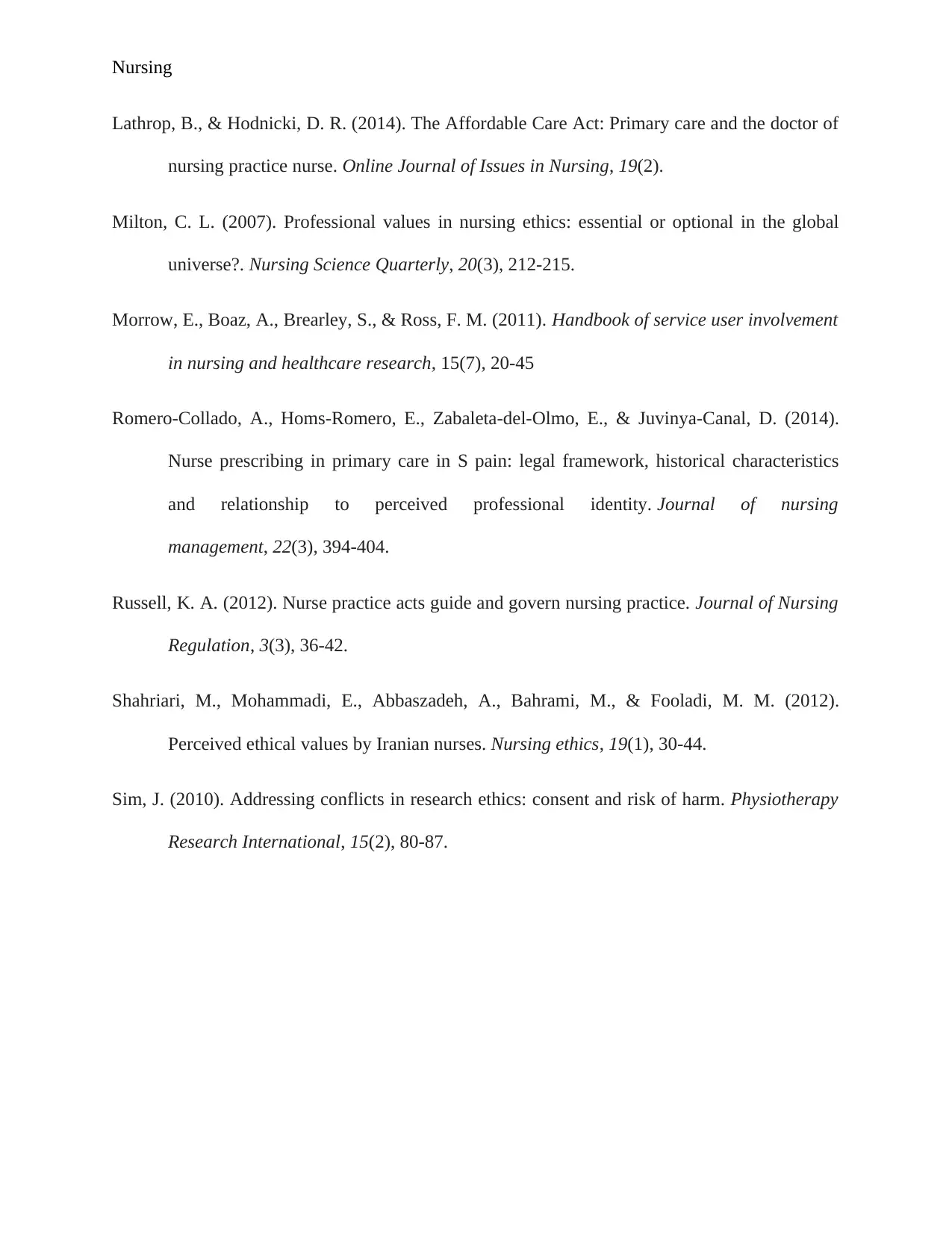
Nursing
Lathrop, B., & Hodnicki, D. R. (2014). The Affordable Care Act: Primary care and the doctor of
nursing practice nurse. Online Journal of Issues in Nursing, 19(2).
Milton, C. L. (2007). Professional values in nursing ethics: essential or optional in the global
universe?. Nursing Science Quarterly, 20(3), 212-215.
Morrow, E., Boaz, A., Brearley, S., & Ross, F. M. (2011). Handbook of service user involvement
in nursing and healthcare research, 15(7), 20-45
Romero‐Collado, A., Homs‐Romero, E., Zabaleta‐del‐Olmo, E., & Juvinya‐Canal, D. (2014).
Nurse prescribing in primary care in S pain: legal framework, historical characteristics
and relationship to perceived professional identity. Journal of nursing
management, 22(3), 394-404.
Russell, K. A. (2012). Nurse practice acts guide and govern nursing practice. Journal of Nursing
Regulation, 3(3), 36-42.
Shahriari, M., Mohammadi, E., Abbaszadeh, A., Bahrami, M., & Fooladi, M. M. (2012).
Perceived ethical values by Iranian nurses. Nursing ethics, 19(1), 30-44.
Sim, J. (2010). Addressing conflicts in research ethics: consent and risk of harm. Physiotherapy
Research International, 15(2), 80-87.
Lathrop, B., & Hodnicki, D. R. (2014). The Affordable Care Act: Primary care and the doctor of
nursing practice nurse. Online Journal of Issues in Nursing, 19(2).
Milton, C. L. (2007). Professional values in nursing ethics: essential or optional in the global
universe?. Nursing Science Quarterly, 20(3), 212-215.
Morrow, E., Boaz, A., Brearley, S., & Ross, F. M. (2011). Handbook of service user involvement
in nursing and healthcare research, 15(7), 20-45
Romero‐Collado, A., Homs‐Romero, E., Zabaleta‐del‐Olmo, E., & Juvinya‐Canal, D. (2014).
Nurse prescribing in primary care in S pain: legal framework, historical characteristics
and relationship to perceived professional identity. Journal of nursing
management, 22(3), 394-404.
Russell, K. A. (2012). Nurse practice acts guide and govern nursing practice. Journal of Nursing
Regulation, 3(3), 36-42.
Shahriari, M., Mohammadi, E., Abbaszadeh, A., Bahrami, M., & Fooladi, M. M. (2012).
Perceived ethical values by Iranian nurses. Nursing ethics, 19(1), 30-44.
Sim, J. (2010). Addressing conflicts in research ethics: consent and risk of harm. Physiotherapy
Research International, 15(2), 80-87.
1 out of 10
Related Documents
Your All-in-One AI-Powered Toolkit for Academic Success.
+13062052269
info@desklib.com
Available 24*7 on WhatsApp / Email
![[object Object]](/_next/static/media/star-bottom.7253800d.svg)
Unlock your academic potential
Copyright © 2020–2026 A2Z Services. All Rights Reserved. Developed and managed by ZUCOL.





